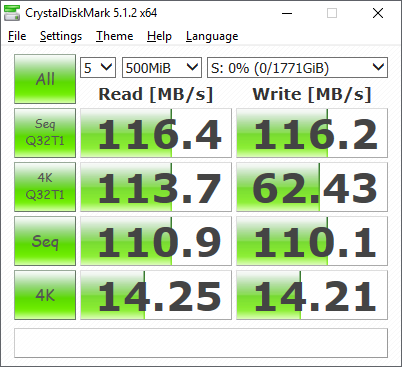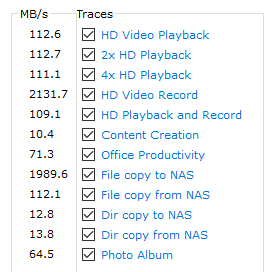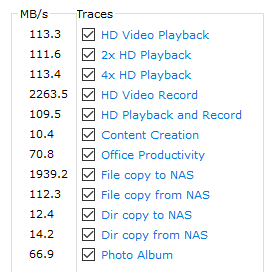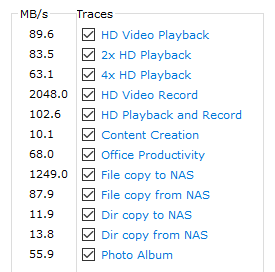The test system used in this review is equipped with an Intel Core i7-6700K CPU, GIGABYTE GA-Z170X-UD3 motherboard, 32GB (16GB x 2) of Crucial Ballistix Sport LT DDR4 memory, Samsung 960 PRO 512GB SSD and a GIGABYTE GeForce GTX 1060 WINDFORCE OC 6G graphics card. For the operating system, I installed a fresh copy of Windows 10 Enterprise.
To test the performance of the Synology DS620slim, I ran a series of benchmarks using CrystalDiskMark 3.0, ATTO Disk Benchmark 2.46, Iometer and the Intel NAS Performance Toolkit. The tests were first run using four WD Black 500GB hard drives configured as RAID 0, 10 and 6 volumes as well as a pair of Seagate IronWolf 110 480GB NAS SSDs that were used for caching. The DS620slim was connected to the computer using CAT6 ethernet cables and a gigabit Cisco switch. Unless otherwise noted, SSD caching has been enabled.
CrystalDiskMark 3.0:
First, I ran a few quick tests using CrystalDiskMark. This benchmark tool measures the performance of a storage device by testing its sequential read and write speeds as well as its random read and write speeds using blocks 4KB and 512KB in size.
According to Synology, the DS620slim is able to read at 226 MB/s and write at 198 MB/s when both networks ports are bonded. Using only one of the gigabit network ports, the NAS was able to read and write at about 116 MB/s.
Thanks to its hardware encryption engine, the DS620slim also performed equally well when doing encrypted file transfers. Once again, it was able to read and write at about 116 MB/s.
ATTO Disk Benchmark 2.46:
I also used ATTO Disk Benchmark to test the DS620slim's sequential read and write speeds. The tests are run using blocks ranging in size from 0.5KB to 8192KB and the total length set to 32MB and 256MB.
The DS620slim's performance was about the same when tested with ATTO. With the four hard drives in a RAID 6 array, the unit topped out at about 116 MB/s when both reading and writing.
Iometer:
Next, I ran a series of tests using Iometer. This tool can be configured to benchmark a number of things. In this case, I used it to measure the DS620slim's sequential read and write speeds using blocks ranging from 512B to 2MB in size. The tests were run using random bytes and a queue depth of 3.

The DS620slim's sequential read performance varied a bit when tested with Iometer. While it was able to read at more than 111 MB/s when using RAID 0 and RAID 10, its read speed topped out at only 100 MB/s when configured for RAID 6.
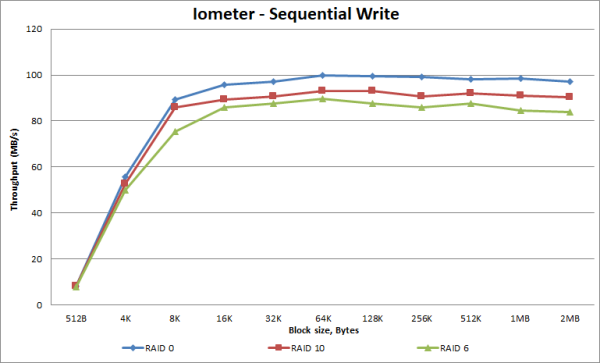
The RAID configuration also had an impact on the DS620slim's sequential write performance. The unit was able to write at nearly 100 MB/s when configured for RAID 0, but was limited to about 89 MB/s when using RAID 6.
Intel NAS Performance Toolkit:
The Intel NAS Performance Toolkit (Intel NASPT) is a file system exerciser and analysis tool designed to enable performance comparisons between network attached storage (NAS) devices. Intel NASPT focuses on user level performance using real world workload traces gathered from typical digital home applications: HD video playback and record, data backup and restore utilities, office productivity applications, video rendering/content creation, and more.
The DS620slim reached some respectable speeds when streaming HD video and copying large files to and from the server. As with other NAS devices though, its transfer rates dropped considerably when creating content and copying directories full of small files to the NAS.


